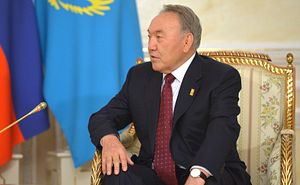There isn’t any evidence that President Nursultan Nazarbayev’s “cold” is anything but a cold. The Kazakh leader canceled a trip to the Caucasus planned for October 12-14, with the presidential press service announcing that he was being treated for a cold on October 11. Nazarbayev was scheduled to visit the Mangystau region in western Kazakhstan, Azerbaijan’s capital Baku, and then Yerevan, Armenia for a Commonwealth of Independent States (CSTO) security council session.
The cancellation and official commentary on Nazarbayev’s health is a rarity. At 76, it can be expected that Nazarbayev is not without health problems on occasion, but the state seldom makes official note of such things. RFE/RL notes that Nazarbayev has been treated in China in the past for “undisclosed health reasons.”
The late-summer death of Uzbekistan’s longtime president, Islam Karimov, at the age of 78, left Nazarbayev as the region’s last remaining true Soviet-era leader as well as Central Asia’s oldest leader. Tajikistan’s Emomali Rahmon is a spry 64, Kyrgyzstan’s Almazbek Atambayev turned 60 last month, and Turkmenistan’s president comes in at 59.
Like Karimov, Nazarbayev has been the subject of health-related rumors over the years, but more importantly, he rests at the center of a political question most democracies have an easy answer to: what happens if the leader dies unexpectedly? The uncertainty (and worries of instability) related to the possible death of a Central Asian president like Karimov or Nazrabayev gives the lie to the region’s claimed “democratic” status. Succession is a hot topic in Central Asia because while the region’s states have constitutions which stipulate procedures for replacing a president should they die mid-term, these procedures are rarely tested and even more rarely followed.
In the case of Turkmenistan — whose Soviet-era leader, the eccentric Saparmurat Niyazov died in December 2006 — the established constitutional succession process was circumvented with a relatively noiseless coup. The chairman of the assembly, Öwezgeldi Ataýew, who was to become acting president, was instead arrested the same day the state said Niyazov died (rumor is he died a few days prior to the announcement). Gurbanuly Berdimuhamadov, at the time deputy prime minister and health minister, was made acting president and “elected” a few months later.
In Uzbekistan, a similar path seems to lay ahead of former Prime Minister Shavkat Mirziyoyev. The chairman of the Senate, Nigmatilla Yuldashev, who was constitutionally to take up the acting presidency until elections waved off the responsibility, proposing Mirziyoyev take over. In the planned December 4 elections, Mirziyoyev is expected to win, with the only question being by how much.
What does constitutional succession look like in Kazakhstan?
Constitutionally, the death of the president is covered in Article 48 which says “in case of his death the powers of the President of the Republic shall be transmitted to the Chairperson of the Senate of the Parliament for the rest of the term.” After the Senate chair, the chairperson of the Mazhilis (lower house, the assembly) and then the prime minister are in line.
Kassym-Jomart Tokayev has been chair of the Senate since 2013, having served a previous term from 2007 to 2011, as well as a stint as prime minister in the late 1990s. Nurlan Nigmatulin returned to the post of chair of the Mazhilis this summer, after serving from 2012 to 2014, with a stint in the presidential administration in between. The prime minister’s office has seen recent turnover, with Bakhytzhan Sagintayev being appointed in September following the unexpected reassignment of Karim Massimov, who held the office from 2007 to 2012 and then from 2014 to last month.
The constitution also notes that whoever becomes interim president loses the powers of the office they held previously and stipulates that they have “no right to initiate amendments and additions to the Constitution of the Republic of Kazakhstan.”
All that laid out nicely, similar to the cases of Turkmenistan and Uzbekistan, there is no precedent or guarantee that everything will go by the book. Many look at the positioning of Nazarbayev’s daughter, recently appointed to the Senate, as possible grooming for succession. Last year, Nazarbayev called for early presidential elections and, surprising no one, won another five-year term, his fifth term. If Nazarbayev sits the full term and runs for election again (while the constitution limits a president to two 5-year terms, the First President is exempt), he’ll be 80.
In the meantime, every time Nazarbayev gets a cold Central Asia watchers will titter. Regional precedent is for constitutions to be circumvented when inconvenient to the ruling elite, and because Kazakhstan has never held an election that observers have deemed free and fair — other than observers from other former Soviet states, of course — the concern many have is understandable. Under Nazarbayev — and riding a two-decade oil boom — Kazakhstan’s’ economy has outperformed its Central Asian neighbors and Nazarbayev has been able to lift the country to a higher global diplomatic plane. But the only rule about the “good times” is that they don’t last forever and populations often take the tumble into hard times out on their elected leaders. Kazakhstan’s economy isn’t performing as it used to and the country may be slipping into its first recession since 1998. Whoever succeeds Nazarbayev — no matter how they get into the office — isn’t likely to have an easy time of it.

































